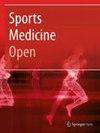Effects of High-Intensity Interval Training on the Parameters Related to Physical Fitness and Health of Older Adults: A Systematic Review and Meta-Analysis
IF 4.1
2区 医学
Q1 SPORT SCIENCES
引用次数: 0
Abstract
As a novel and time-efficient exercise form, high-intensity interval training (HIIT) has shown great potential in improving health-related physical fitness among diverse populations. However, empirical evidence on its efficacy among the elderly has not been well summarized. This systematic review and meta-analysis aimed to determine the effect of HIIT interventions on the parameters related to physical fitness and health of older adults, including resting heart rate (HR), systolic blood pressure (SBP), diastolic blood pressure (DBP), cardiorespiratory fitness (CRF), body mass index (BMI), body fat percent (BF%), waist circumference (WC), muscular endurance (ME), muscular strength (MS), muscular power (MP), balance and flexibility, compared to non-exercise and other-exercise (e.g., moderate-intensity continuous training, resistance training) conditions. Literature published from January 2000 to May 2023 was collected through extensive searches across eight databases and relevant review papers. Randomized controlled trials (RCTs) featuring a minimum 2-week exercise intervention for older adults (≥ 60 years) were included. The pooled effect size of Hedges’g was estimated using random-effects models in R. Meta-regression was performed for both categorical (health status, duration of training programme, and frequency) and continuous moderators (mean age, male rate, and attrition rate). Forty-four eligible RCTs with 1863 participants (52.1% female; 60.5–81.2 years) were included in the quantitative analysis. Compared to non-exercise condition, HIIT significantly improved resting HR (g = -0.36, 95%CI = [-0.67, -0.05], P = 0.032), SBP (g = -0.29, 95%CI = [-0.54, -0.03], P = 0.008), CRF (g = 0.77, 95%CI = [0.51, 1.04], P < 0.001), BF% (g = -0.26, 95%CI = [-0.41, -0.11], P = 0.006), MS (g = 0.47, 95%CI = [0.23, 0.71], P = 0.004), ME (g = 0.65, 95%CI = [0.10, 1.19], P = 0.036), and balance (e.g., timed-up-and-go) (g = -0.79, 95%CI = [-1.19, -0.40], P = 0.035). Compared to other-exercise condition, HIIT significantly improved resting HR (g = -0.11, 95%CI = [-0.21, -0.01], P = 0.029), SBP (g = -0.14, 95%CI = [-0.28, -0.01], P = 0.038), and CRF (g = 0.23, 95%CI = [0.07, 0.38], P = 0.008). No significant difference was found between HIIT and non-exercise condition for DBP, BMI and WC, as well as between HIIT and other-exercise condition for DBP, BMI, BF%, WC, ME, and balance (all P > 0.05). Meta-regression indicated that mean age moderated the HIIT effect on resting HR (b = -0.02, P = 0.014; HIIT vs. other-exercise condition) and SBP (b = 0.03, P = 0.048; HIIT vs. non-exercise), and attrition rate moderated the effect on CRF (b = 0.03, P = 0.007; HIIT vs. non-exercise). This study supports the efficacy of HIIT in improving resting HR, SBP, CRF, BF%, MS, ME and balance among older adults. More empirical evidence is needed to determine the efficacy of HIIT for MP and flexibility in this population. PROSPERO CRD42022316246. • HIIT is an effective approach for improving older adults’ resting heart rate (HR), systolic blood pressure (SBP), cardiorespiratory fitness (CRF), body fat percent (BF%), muscular strength (MS), and balance, compared with non-exercise condition. • HIIT outperformed the other exercise interventions in improving older adults’ resting HR, SBP, CRF, and muscular endurance (ME). • Mean age and attrition rate were identified as potential moderators for the HIIT effects on resting HR, SBP and CRF.高强度间歇训练对老年人体能和健康相关参数的影响:系统回顾与元分析
高强度间歇训练(HIIT)作为一种新颖、省时的运动形式,在改善不同人群的健康相关体能方面显示出巨大的潜力。然而,有关其在老年人中疗效的经验证据尚未得到很好的总结。本系统综述和荟萃分析旨在确定 HIIT 干预对老年人体能和健康相关参数的影响,这些参数包括静息心率(HR)、收缩压(SBP)、舒张压(DBP)、心肺功能(HR)、血压(SBP)、心率(HR)、血压(DBP)和心率(SBP)、心肺功能(CRF)、体重指数(BMI)、体脂率(BF%)、腰围(WC)、肌肉耐力(ME)、肌肉力量(MS)、肌肉力量(MP)、平衡能力和柔韧性。g.,中等强度持续训练、阻力训练)条件下进行比较。通过对八个数据库和相关综述论文进行广泛检索,收集了 2000 年 1 月至 2023 年 5 月期间发表的文献。研究纳入了针对老年人(≥ 60 岁)进行至少 2 周运动干预的随机对照试验(RCT)。使用 R 中的随机效应模型估算了 Hedges'g 的集合效应大小,并对分类(健康状况、训练计划持续时间和频率)和连续调节因子(平均年龄、男性比率和自然减员率)进行了元回归。定量分析纳入了 44 项符合条件的 RCT,共有 1863 名参与者(52.1% 为女性;60.5-81.2 岁)。与非运动状态相比,HIIT 能显著改善静息心率(g = -0.36,95%CI = [-0.67,-0.05],P = 0.032)、SBP(g = -0.29,95%CI = [-0.54,-0.03],P = 0.008)、CRF(g = 0.77,95%CI = [0.51,1.04],P 0.05)。元回归表明,平均年龄可调节 HIIT 对静息心率(b = -0.02,P = 0.014;HIIT 与其他运动条件对比)和 SBP(b = 0.03,P = 0.048;HIIT 与非运动对比)的影响,而损耗率可调节对 CRF 的影响(b = 0.03,P = 0.007;HIIT 与非运动对比)。这项研究支持 HIIT 在改善老年人静息心率、SBP、CRF、BF%、MS、ME 和平衡方面的功效。要确定 HIIT 对这一人群的 MP 和灵活性的功效,还需要更多的实证证据。PERCORCO CRD42022316246.- 与非运动状态相比,HIIT 是一种有效的方法,可改善老年人的静息心率(HR)、收缩压(SBP)、心肺功能(CRF)、体脂率(BF%)、肌肉力量(MS)和平衡能力。- 在改善老年人静息心率、SBP、CRF和肌肉耐力(ME)方面,HIIT优于其他运动干预措施。- 平均年龄和自然减员率被认为是 HIIT 对静息心率、SBP 和 CRF 影响的潜在调节因素。
本文章由计算机程序翻译,如有差异,请以英文原文为准。
求助全文
约1分钟内获得全文
求助全文

 求助内容:
求助内容: 应助结果提醒方式:
应助结果提醒方式:


